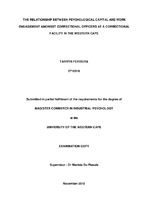The relationship between psychological capital and work engagement amongst correctional officers at a correctional facility in the Western Cape
Abstract
The correctional facility, and in particular the job of the correctional officer, remain a unique field of study, as there has not been much research done on the population other than stress-related studies. Although the correctional environment is one of the most dangerous and volatile working environments, there is still a number of correctional officers who remain motivated in their role until the day they retire. Many studies conducted on correctional officers, focused on the negativity associated with the role, resulting in minimal positively focused research. With the recent development in the field of positive psychology and the dimensions of psychological capital it is believed that human resources and psychological strengths assist with improving an employee‟s performance. At present psychological capital is seen as an important concept in helping employees cope with their working environments, resulting in the success of the organisation. Research has also shown a link between an individual‟s psychological capital and their level of work engagement. Having correctional officers being positively engaged in their workplace, will firstly result in the successful operation of correctional facilities and secondly it will allow the department of correctional services to achieve their vision and mission in protecting society from harmful individuals and rehabilitating the inmates to successfully integrate into society again. Data for this present study was collected through a biographical questionnaire, the Psychological Capital Questionnaire (PCQ) and the work and well-being questionnaire (UWES-17). A convenience sample was utilized, with 122 correctional officers completing the questionnaires. The data was then analyzed using a statistical package for the social sciences (SPSS). This study found that psychological capital does influence work engagement amongst the sample of correctional officers, specifically the psychological capital dimension hope influencing the work engagement dimension vigour. Furthermore optimism explained the greatest proportion of the variance in work engagement. Recommendations for the organisation and future research were proposed.

